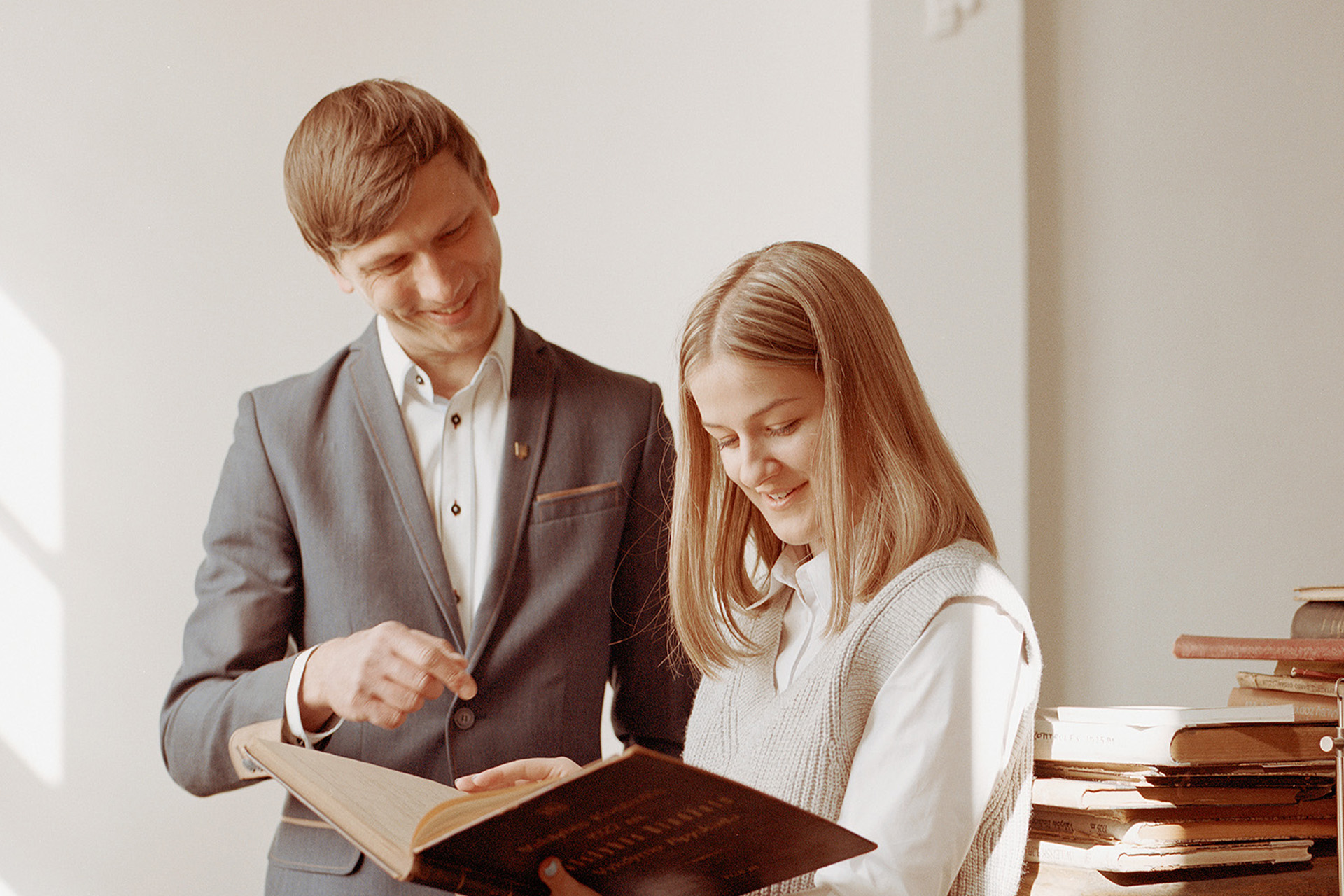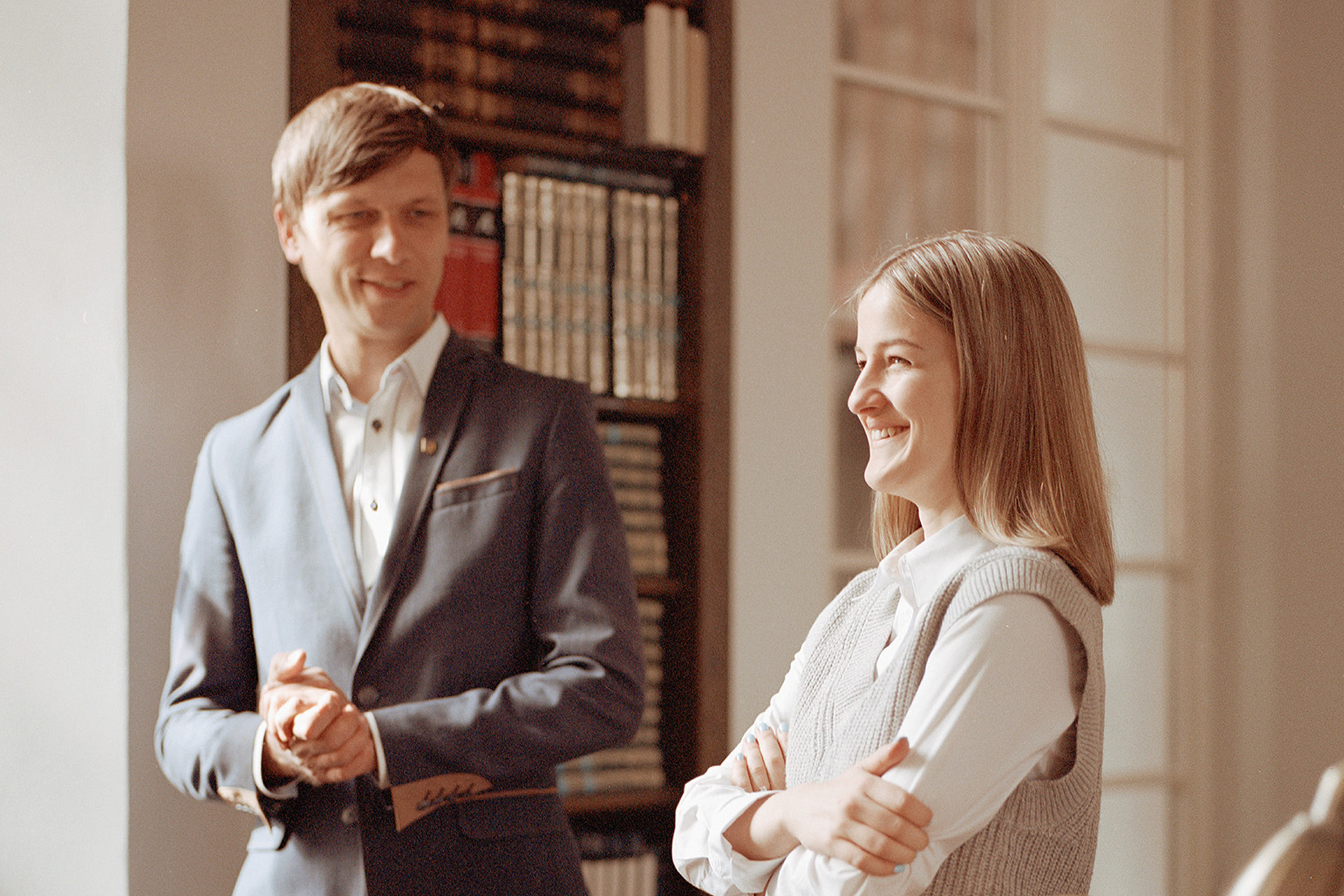Lecturer and Student on the Increased Importance of Political Communication: Volodymyr Zelenskyy Has Become an Example
 Ugnė Unguraitytė, a third-year student of journalism in the Faculty of Communication at Vilnius University (VU KF), met Andrius Šuminas, an Associate Professor, during her first year of studies when the lecturer was responsible for U. Unguraitytė’s group in lectures on communication theories. Today, the lecturer and student are colleagues, currently researching the communication practices of Lithuanian politicians on the social network Instagram during the 2020 elections to the Seimas. According to these experts in observing the communication among politicians on a global scale, the importance of political communication has grown even more in the face of the war in Ukraine, while the leader of Ukraine, President Volodymyr Zelenskyy, has become an example for many politicians.
Ugnė Unguraitytė, a third-year student of journalism in the Faculty of Communication at Vilnius University (VU KF), met Andrius Šuminas, an Associate Professor, during her first year of studies when the lecturer was responsible for U. Unguraitytė’s group in lectures on communication theories. Today, the lecturer and student are colleagues, currently researching the communication practices of Lithuanian politicians on the social network Instagram during the 2020 elections to the Seimas. According to these experts in observing the communication among politicians on a global scale, the importance of political communication has grown even more in the face of the war in Ukraine, while the leader of Ukraine, President Volodymyr Zelenskyy, has become an example for many politicians.
U. Unguraitytė explained that back when she had just started her Bachelor’s studies, she already knew she would like to continue working on a Master’s degree, so when she was in her second year, she took the initiative and started looking for a lecturer who would agree to cooperate in her research. The student knew she was most interested in the field of political communication, so she sent letters to several lecturers who were researching that subject. However, she had no clear vision about what or who would be the subject of her analysis, so she hoped that at least one of the lecturers would agree to supervise her work, as well as being willing to advise, consult and collaborate.
According to U. Unguraitytė, not every student is cut out for research. “I personally see great value in participating in such activities and taking the initiative. When I approached the lecturer, I had no previous experience in doing any kind of research, so I constantly needed consultations, explanations and guidance to keep moving in the right direction. I had little knowledge, but a lot of desire to succeed. I was lucky that the lecturer always patiently explained everything and offered me advice. I really believe that research, data collection, monitoring and analysis are not for everyone, as many of those in my student group do not understand how I can bring myself to work on my research, and many find it boring, but I disagree. It’s what drives me,” the student explained.
“The way that Ugnė approached me isn’t something students do frequently. It would be great if more students wanted to voluntarily try their hand at research. However, Ugnė is an exception, as there aren’t many students as enterprising as she is. I was really glad to receive her letter and suggested some topics that she could delve into without hesitation,” said Assoc. Prof. Dr A. Šuminas.
Is the Ukraine President’s communication that of a world leader?
Back when U. Unguraitytė approached Assoc. Prof. Dr A. Šuminas in relation to voluntary research, he was analysing political communication on the Facebook social network. Therefore, he suggested that U. Unguraitytė could conduct similar research on another popular social network: Instagram. After discussing the details, the lecturer A. Šuminas and the student Ugnė began researching how Lithuanian politicians and parties used the Instagram social platform during the 2020 elections to the Seimas.
“Instagram is very popular around the world, so the research related to this platform is constantly and rapidly increasing, but in Lithuania, this social platform has not been studied much yet. In particular, there has been no research on the political communication on Instagram. Therefore, Ugnė and I decided to delve into that subject. We collected a large array of data, coded and filtered it via a certain code book, and we are now working with this material and analysing it. The data is really revealing and new, so the result should be interesting,” the VU lecturer said.
Both the lecturer, Assoc. Prof. Dr A. Šuminas, and the student U. Unguraitytė noted that now, in the context of the war in Ukraine, political communication on social media is especially important. Due to the information shared on social media platforms, as well as the video publishing speed, we can learn the latest news about the war in Ukraine in just a few minutes or seconds. With the help of these social networks, politicians can also communicate directly with both the media and people around the world.
Assoc. Prof. Dr A. Šuminas said that the Ukrainian leader, President Volodymyr Zelenskyy, who was active on social networks, instantly captivated the whole world and became an example to other politicians for a reason. The way that the Ukraine president speaks, and the way he seems to be able to captivate his audience and properly place the accents in his speeches, is an example of excellent and very effective communication.
“President V. Zelenskyy has become a world leader and a benchmark of leadership, as an example that the leaders of other countries imitate. They have begun to imitate not only his behaviour, but also his outfits. We are seeing Volodymyr Zelenskyy on television all the time, as well as on social media where his speeches are posted. The president’s rhetoric is always simple, but it’s very compelling and understandable to everyone. V. Zelenskyy’s ability to build tension in his audience, make pauses in his speeches when needed, and to make jokes when the time is right are the qualities that make the president’s communication so influential. That’s why others want to replicate it. In addition, the way that Volodymyr Zelenskyy is able to address different audiences, convey the pain of the Ukrainian people and recount the horrors occurring in Ukraine is an example of very successful communication,” Assoc. Prof. Dr A. Šuminas said.

According to Assoc. Prof. Dr A. Šuminas, the world has grown tired of the war in Ukraine, so he noted that the Ukrainian president’s main goal in communicating now is to keep people’s attention and ignite further support for his country.
U. Unguraitytė said that although social networks are helping us keep up with the war in Ukraine, it should be borne in mind that they are full of false information and propaganda: “We should not trust every message coming from an unclear, unconfirmed source, or transfer money to every account that appears on a social network allegedly collecting support for Ukraine. There are propagandists who are seeking to mislead not only in the aggressor country, but also those around us, so we must not forget to check the information we receive before spreading it further so that we do not become propagandists ourselves.
The VU associate professor explained that disinformation is now very widespread on social media, so it would be naive to expect a social network to start blocking those who are spreading false information. Therefore, the most appropriate way to combat propaganda is to educate people and teach them about making appropriate choices when it comes to information.
At the university, the student and lecturer are colleagues
The student Ugnė said that she has met many lecturers in the Faculty of Communication who have inspired her to take an interest in certain fields and have motivated her studies. “Sometimes, you listen to a particular lecturer and think you would like to be like them,” Ugnė said. However, Assoc. Prof. Dr A. Šuminas explained that sometimes not only lecturers motivate the students, but it is also the other way around.
“There are students who are genuinely interested in your lectures and you can spot them in the classroom right away, by noticing the interest in their eyes. It sometimes happens that those students inspire me. A good discussion or a well-written paper motivates me, and I also feel a great deal of satisfaction. It leads to new ideas, insights and discussions, which make me think and reconsider the theories I’ve been teaching for years from another perspective,” Assoc. Prof. Dr A. Šuminas said.
“During my lectures, I try to ensure my students see me as a colleague. When necessary, I try to be a beacon offering advice and consultations, and if needed, I sometimes criticise them a little, but most importantly, I try to be a colleague who encourages my students to approach me, ask questions and start discussions,” said Assoc. Prof. Dr A. Šuminas.
The student U. Unguraitytė said that from the first lectures, she felt that the lecturer was very open with students and could be trusted.
“When you come to university and meet a lecturer with a lot of degree-descriptive acronyms in front of his last name who calls you a ‘colleague’, this seemingly small detail helps build a closer connection. Assoc. Prof. Dr Andrius Šuminas’s lectures made me feel comfortable and free, as I knew that the lecturer was open and would answer all my questions, even the silly ones. At university, no one forces you to do anything. Instead, your results depend on the effort you put in. So, since you’re here, don’t be afraid to take a step forward, act and ask questions, and take the initiative, as there is always a lecturer who will help you,” U. Unguraitytė confirmed.
In recognition of the importance of developing a relationship between teachers and students, and having the courage to ask questions, VU is presenting an art project and a virtual exhibition, in collaboration with the documentary and portrait photographer Tadas Kazakevičius. The exhibition features a series of portraits of Assoc. Prof. Dr A. Šuminas and U. Unguraitytė, revealing their sincere relationship.